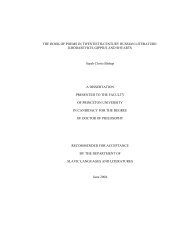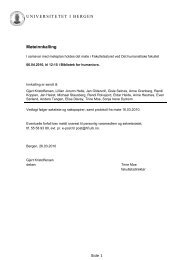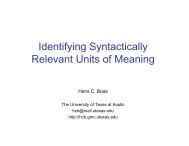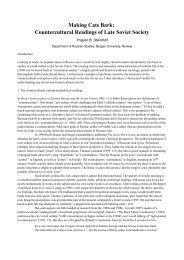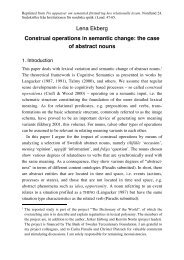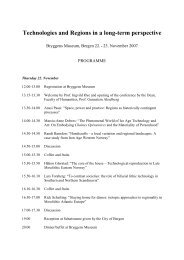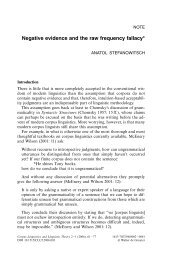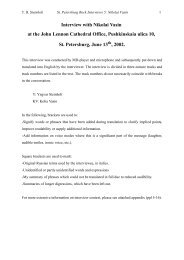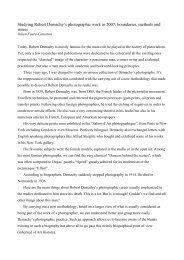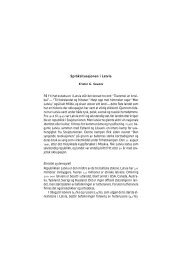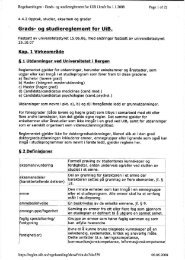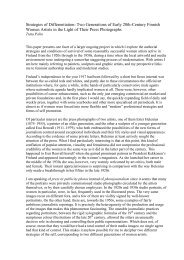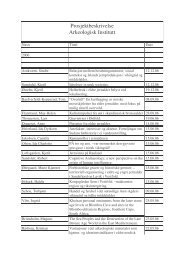Jostein Børtnes Dostoevsky's Idiot or the Poetics of Emptiness1 ...
Jostein Børtnes Dostoevsky's Idiot or the Poetics of Emptiness1 ...
Jostein Børtnes Dostoevsky's Idiot or the Poetics of Emptiness1 ...
Create successful ePaper yourself
Turn your PDF publications into a flip-book with our unique Google optimized e-Paper software.
From <strong>the</strong> moment Dostoevsky’s preliminary notes to The <strong>Idiot</strong> were first<br />
published by Sakulin and Belchikov in 1931, <strong>the</strong> study <strong>of</strong> <strong>the</strong> novel has drawn heavily<br />
on this material. It has <strong>of</strong>ten taken <strong>the</strong> f<strong>or</strong>m <strong>of</strong> a kind <strong>of</strong> shuttle traffic between<br />
notebooks and finished text in an attempt to solve <strong>the</strong> enigmas <strong>of</strong> <strong>the</strong> latter by<br />
statements found in <strong>the</strong> f<strong>or</strong>mer.<br />
The prevailing idea <strong>of</strong> Prince Myshkin as an imitat<strong>or</strong> <strong>of</strong> Christ has been well<br />
summarised by Theod<strong>or</strong>e Ziolkovski (1972:104):<br />
Prince Myshkin is a truly Christlike man — in his manuscript notes<br />
Dostoevskij once refers to him as «Prince Christ» — <strong>of</strong> great m<strong>or</strong>al beauty.<br />
But to make him plausible as a human being Dostoevskij found it necessary to<br />
mar his m<strong>or</strong>al beauty with certain flaws. [...] Dostoevskij drew his Christlike<br />
man as a severe epileptic who eventually, at <strong>the</strong> end <strong>of</strong> <strong>the</strong> book, is reduced to<br />
babbling idiocy — <strong>the</strong> savi<strong>or</strong> as idiot!<br />
In representing Prince Myshkin in this way, Dostoevsky was, acc<strong>or</strong>ding to Ziolkovski<br />
(1972:104), «exploiting <strong>the</strong> ancient topos that associates divine truth with madness : in<br />
<strong>the</strong> eyes <strong>of</strong> society <strong>the</strong> savi<strong>or</strong> <strong>or</strong> redeemer appears as a fool».<br />
The only critic to my knowledge who has contested this interpretation <strong>of</strong> Prince<br />
Myshkin, is J. P. Stern. In an acute analysis <strong>of</strong> <strong>Dostoevsky's</strong> hero he observes that<br />
«even though nei<strong>the</strong>r <strong>the</strong> novel n<strong>or</strong> <strong>the</strong> notebooks contain a single w<strong>or</strong>d in<br />
affirmation <strong>of</strong> a divine <strong>or</strong>igin <strong>of</strong> Myshkin's illness, <strong>the</strong>re can be no doubt that his total<br />
person is intended as something like an imitatio Christi. "Yet, what Dostoevsky shows,<br />
"is <strong>the</strong> defective nature <strong>of</strong> Myshkin's imitatio." (Stern 1973:16f.):<br />
in <strong>the</strong> end <strong>the</strong> w<strong>or</strong>ld proves to be too much f<strong>or</strong> him. Its sins and s<strong>or</strong>rows lie<br />
too heavily on it — too heavily f<strong>or</strong> him to redeem <strong>the</strong>m. His imitatio is<br />
defective, not because it is merely human — given <strong>the</strong> limits <strong>of</strong> <strong>the</strong> convention<br />
Dostoevskij has chosen, <strong>the</strong> re-enacting <strong>of</strong> Christ could not be anything else.<br />
4



